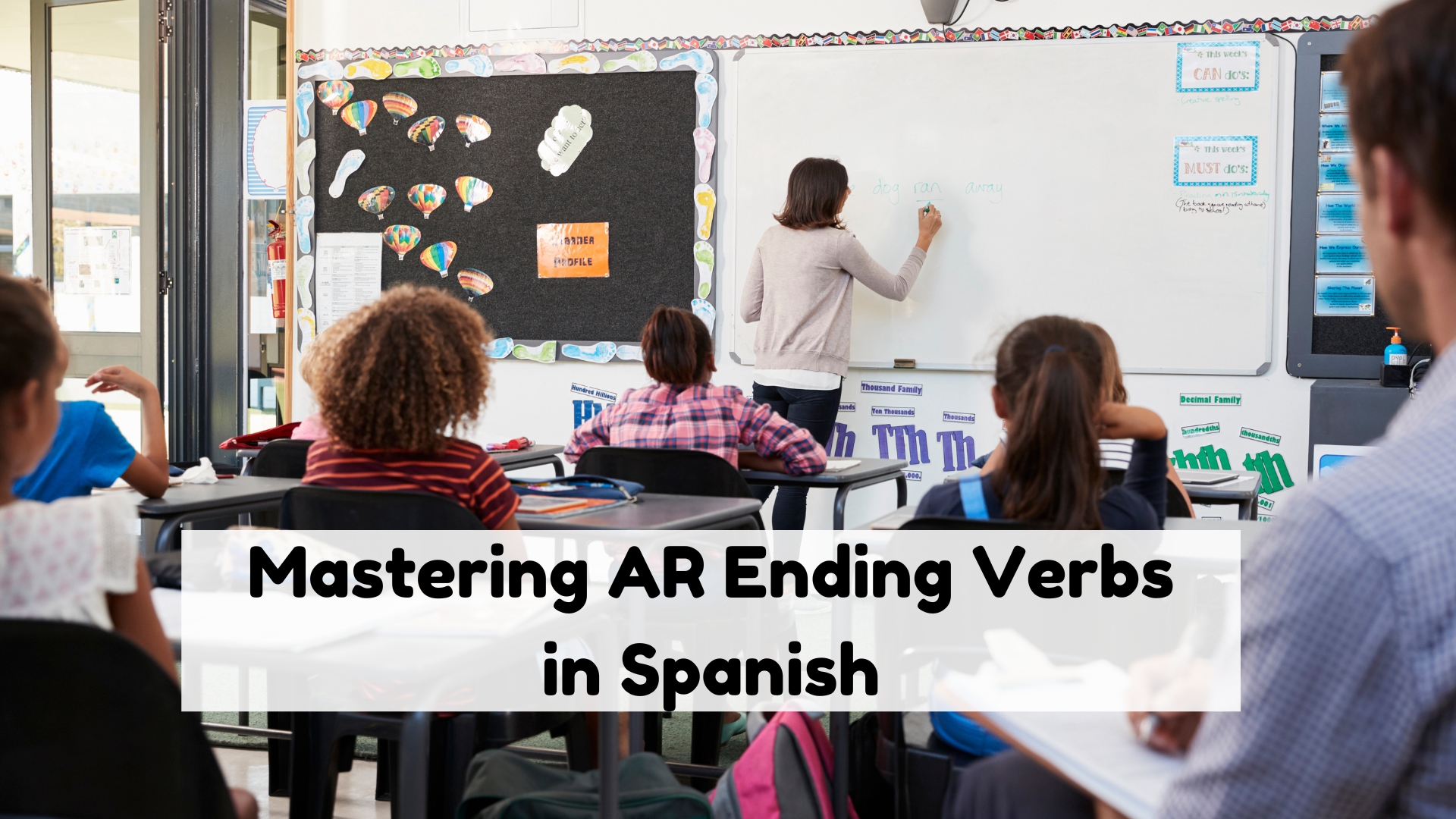In Spanish, verbs that end in ‘AR’ are crucial if you want to speak the language well. They make up a big part of the Spanish vocabulary and are key to learning how to conjugate verbs in different situations, like past, present, or future. These verbs change form depending on the context, such as when giving an order, asking a question, or expressing a possibility.
Understanding how to use ‘AR’ ending verbs can really improve your Spanish. They get tricky when you add negatives or questions. Let’s dive into that and see how it works.
Spanish Verbs
Spanish verbs typically end in -ar, -er, or -ir. These endings shape how the verb changes to fit different situations, which is key to getting Spanish right.
Knowing how these patterns work helps you communicate clearly and understand the language better, whether you’re chatting casually or speaking more formally.
Indicative mood
The indicative mood in Spanish helps you talk about facts and certainties. It includes several tenses for verbs ending in -AR, like talking in the present, past, and future. These tenses help you describe actions at different times, making your conversations in Spanish clearer and more effective.
Now, mastering these conjugations really boosts your ability to communicate well. You can share past stories, explain current situations, or discuss future plans—all in Spanish. It’s a great skill to have, right?
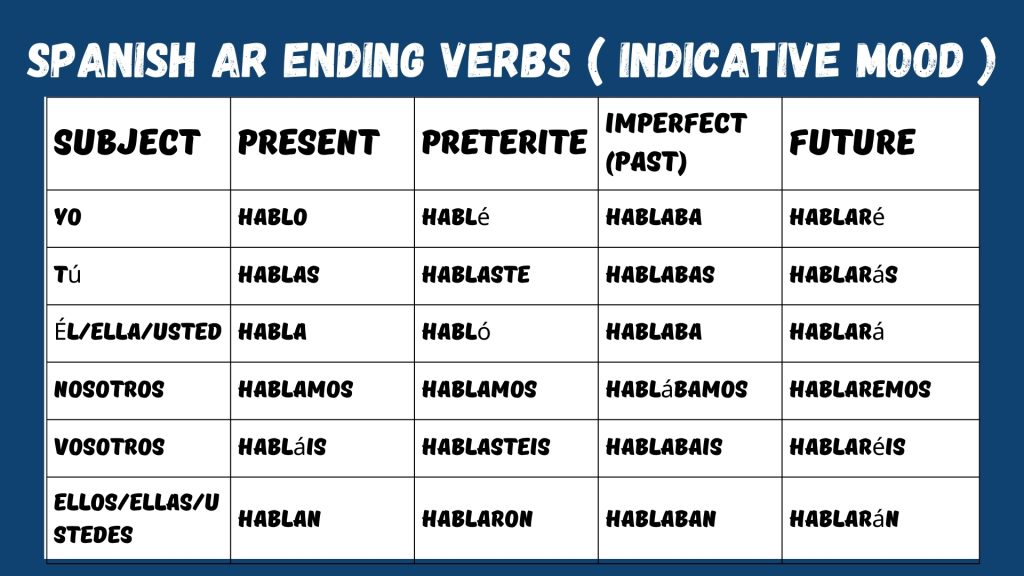
Present AR verb conjugation
To conjugate regular -ar verbs in the present tense, you start by taking off the -ar ending. Then, you add different endings based on who’s doing the action. Let’s take the verb ‘hablar’ as an example:
- For ‘I speak,’ it’s ‘hablo.’
- For ‘you speak,’ it’s ‘hablas.’
- For ‘he or she speaks,’ it’s ‘habla.’
- For ‘we speak,’ it’s ‘hablamos.’
- For ‘you all speak,’ it’s ‘habláis.’
- For ‘they speak,’ it’s ‘hablan.’
| Subject | Verb (Hablar) | Sentence |
|---|---|---|
| Yo | hablo | Yo hablo con mi madre todos los días. |
| Tú | hablas | Tú hablas demasiado rápido. |
| Él/Ella/Usted | habla | Ella habla tres idiomas. |
| Nosotros | hablamos | Nosotros hablamos sobre el proyecto. |
| Vosotros | habláis | Vosotros habláis en la reunión. |
| Ellos/Ellas/Ustedes | hablan | Ellos hablan sobre su viaje. |
Imperfect AR verb conjugation
To conjugate regular -ar verbs in the imperfect indicative mood, start by dropping the -ar ending. Then, add the right endings depending on who is doing the action. Here are the endings: use -aba for ‘I,’ -abas for ‘you’ (informal), -aba for ‘he,’ ‘she,’ or ‘you’ (formal), -ábamos for ‘we,’ -abais for ‘you all’ (informal), and -aban for ‘they’ or ‘you all’ (formal). This tense is used to talk about actions that were ongoing or usual in the past.
| Subject | Verb (Bailar) | Sentence |
|---|---|---|
| Yo | bailaba | Yo bailaba en la fiesta. |
| Tú | bailabas | Tú bailabas salsa muy bien. |
| Él/Ella/Usted | bailaba | Ella bailaba en la escuela de danza. |
| Nosotros | bailábamos | Nosotros bailábamos todas las noches. |
| Vosotros | bailabais | Vosotros bailabais en el teatro. |
| Ellos/Ellas/Ustedes | bailaban | Ellos bailaban en la competencia. |
Preterite AR verb conjugation
Conjugating -ar verbs in the past tense is straightforward. It’s all about changing the verb endings to show that something was completed in the past.
Here’s how it works: for ‘I’ (yo), you add ‘-é’. For ‘you’ (tú), it’s ‘-aste’. The ‘he/she/you formal’ (él/ella/usted) form ends in ‘-ó’, and ‘we’ (nosotros) use ‘-amos’. If you’re talking about ‘you all’ in Spain (vosotros), you’ll use ‘-asteis’, and for ‘they’ or ‘you all formal’ (ellos/ellas/ustedes), it ends in ‘-aron’.
This makes it easy to tell it’s past tense, different from other tenses.
| Subject | Verb (Cantar) | Sentence |
|---|---|---|
| Yo | canté | Yo canté en el concierto. |
| Tú | cantaste | Tú cantaste una canción hermosa. |
| Él/Ella/Usted | cantó | Ella cantó muy bien en la boda. |
| Nosotros | cantamos | Nosotros cantamos en el coro. |
| Vosotros | cantasteis | Vosotros cantasteis juntos en el evento. |
| Ellos/Ellas/Ustedes | cantaron | Ellos cantaron en la fiesta. |
Future AR verb conjugation
After we looked at how -ar verbs change in the preterite tense for past actions, let’s now check out their future tense forms in the indicative mood.
To conjugate regular -ar verbs in the future tense, you just add the endings -é, -ás, -á, -emos, -éis, and -án right to the infinitive form. For instance, ‘hablar’ turns into ‘hablaré,’ ‘hablarás,’ ‘hablará,’ ‘hablaremos,’ ‘hablaréis,’ and ‘hablarán.’
Simple, right?
| Subject | Verb (Viajar) | Sentence |
|---|---|---|
| Yo | viajaré | Yo viajaré a España el próximo mes. |
| Tú | viajarás | Tú viajarás con tu familia. |
| Él/Ella/Usted | viajará | Ella viajará a París en verano. |
| Nosotros | viajaremos | Nosotros viajaremos en tren. |
| Vosotros | viajaréis | Vosotros viajaréis juntos en diciembre. |
| Ellos/Ellas/Ustedes | viajarán | Ellos viajarán por todo el mundo. |
Present perfect AR verb conjugation
The present perfect tense in Spanish is pretty straightforward. You just need to use the verb ‘haber’ along with the past participle of an -ar verb. Here’s how you do it: start with ‘haber’ in its various forms—’he’, ‘has’, ‘ha’, ‘hemos’, ‘habéis’, ‘han’. Then, attach the past participle of the verb you’re dealing with, which for -ar verbs ends in ‘-ado’. Take ‘hablar’ as an example: it turns into ‘hablado’. So, you get combinations like ‘he hablado’ which means ‘I have spoken’.
It’s like piecing together a simple puzzle. First, pick the correct form of ‘haber’ depending on who you’re talking about—I, you, he/she, we, you all, or they. Then just tack on the right ending to your main verb. That’s all there is to it!
| Subject | Verb (Trabajar) | Sentence |
|---|---|---|
| Yo | he trabajado | Yo he trabajado en esa empresa. |
| Tú | has trabajado | Tú has trabajado mucho esta semana. |
| Él/Ella/Usted | ha trabajado | Él ha trabajado en un hospital. |
| Nosotros | hemos trabajado | Nosotros hemos trabajado en el campo. |
| Vosotros | habéis trabajado | Vosotros habéis trabajado juntos. |
| Ellos/Ellas/Ustedes | han trabajado | Ellos han trabajado en una oficina. |
Past perfect AR verb conjugation
The past perfect tense in Spanish builds on the present perfect tense. It uses the verb ‘haber’ and adds the past participle of an -ar verb, like ‘hablar’ for ‘to speak.’ So, ‘había hablado’ translates to ‘had spoken.’ This form is used to talk about something that was completed before another event in the past.
| Subject | Verb (Mirar) | Sentence |
|---|---|---|
| Yo | había mirado | Yo había mirado esa película antes. |
| Tú | habías mirado | Tú habías mirado la luna anoche. |
| Él/Ella/Usted | había mirado | Él había mirado todas las fotos. |
| Nosotros | habíamos mirado | Nosotros habíamos mirado el partido. |
| Vosotros | habíais mirado | Vosotros habíais mirado las noticias. |
| Ellos/Ellas/Ustedes | habían mirado | Ellos habían mirado la televisión. |
Anterior perfect AR verb conjugation
The anterior perfect tense for -ar verbs in Spanish shows that something was finished before another past event.
You use the past form of ‘haber’ plus the past participle.
For example, ‘había hablado’ means ‘had spoken.’
It helps make the timeline clear when you tell a story.
Future perfect AR verb conjugation
After looking at the anterior perfect tense, let’s dive into how we use the future perfect tense for AR verbs in everyday conversation.
It’s pretty straightforward: this tense is all about talking about things that haven’t happened yet but will be finished by a certain time in the future.
You just need the future tense of ‘haber’ plus the past participle. So, if you say ‘habré hablado,’ it means ‘I will have spoken.’ Simple, right?
| Subject | Verb (Comprar) | Sentence |
|---|---|---|
| Yo | habré comprado | Yo habré comprado un coche nuevo. |
| Tú | habrás comprado | Tú habrás comprado ese libro. |
| Él/Ella/Usted | habrá comprado | Ella habrá comprado comida. |
| Nosotros | habremos comprado | Nosotros habremos comprado boletos. |
| Vosotros | habréis comprado | Vosotros habréis comprado la entrada. |
| Ellos/Ellas/Ustedes | habrán comprado | Ellos habrán comprado una casa. |
Irregular Preterite Verbs in Spanish – Explore other irregular verbs like ser, hacer, and tener.
Conditional mood
In the conditional mood, Spanish -AR verbs have special ways of changing to express what might happen or what could be imagined. You start with the verb’s base form and add certain endings to form the simple conditional. For the perfect conditional, you use the auxiliary verb ‘haber’ in its conditional form plus the past participle of the main verb.
By mastering these forms, you can talk about events that aren’t real, which really helps you get better at Spanish.
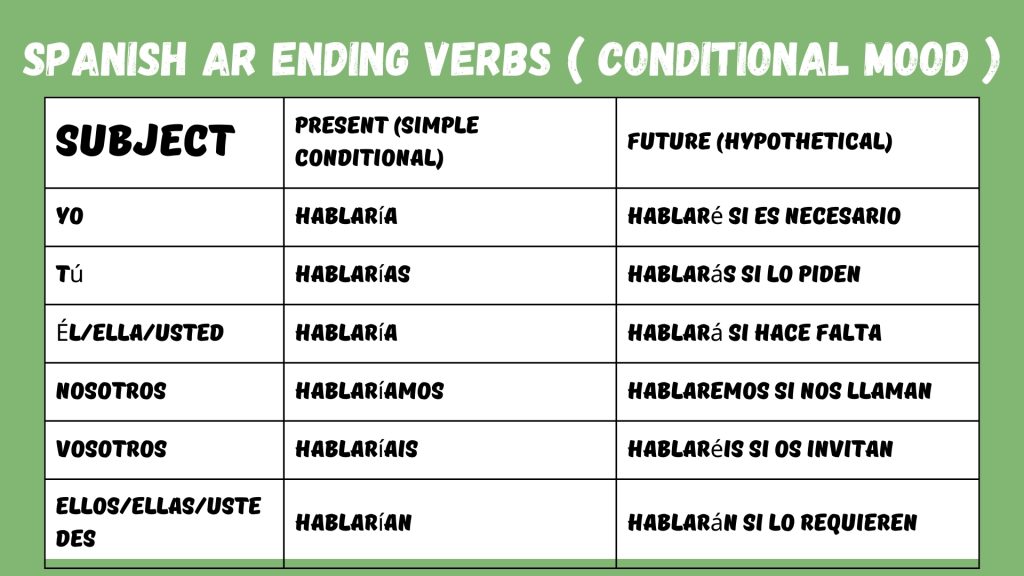
Simple conditional AR verb conjugation
In Spanish, when you want to talk about what might happen or what could be, you use the conditional mood.
It’s pretty simple with regular -ar verbs. Just add -ía, -ías, -ía, -íamos, -íais, -ían right to the end of the infinitive.
Take ‘hablar,’ which means ‘to talk.’ If you want to say ‘I would talk,’ you just say ‘hablaría.’
This pattern works the same way with other subjects, helping you express different future possibilities that depend on certain conditions.
| Subject | Verb (Bailar) | Sentence |
|---|---|---|
| Yo | bailaría | Yo bailaría si tuviera tiempo. |
| Tú | bailarías | Tú bailarías en la fiesta. |
| Él/Ella/Usted | bailaría | Ella bailaría con su novio. |
| Nosotros | bailaríamos | Nosotros bailaríamos juntos. |
| Vosotros | bailaríais | Vosotros bailaríais toda la noche. |
| Ellos/Ellas/Ustedes | bailarían | Ellos bailarían si la música fuera buena. |
Perfect conditional AR verb conjugation
When you dive into the perfect conditional conjugation of -ar verbs, you get to play with the idea of ‘what might have been’ in Spanish. Here’s how it works: you take the conditional form of ‘haber’ and add the past participle. So, you end up with phrases like ‘habría hablado,’ which translates to ‘would have spoken.’
This tense is great for talking about things that could have happened but didn’t. It adds a really interesting twist to regular conversations.
| Subject | Verb (Trabajar) | Sentence |
|---|---|---|
| Yo | habría trabajado | Yo habría trabajado más horas. |
| Tú | habrías trabajado | Tú habrías trabajado en el restaurante. |
| Él/Ella/Usted | habría trabajado | Él habría trabajado con su hermano. |
| Nosotros | habríamos trabajado | Nosotros habríamos trabajado en el campo. |
| Vosotros | habríais trabajado | Vosotros habríais trabajado juntos. |
| Ellos/Ellas/Ustedes | habrían trabajado | Ellos habrían trabajado en el proyecto. |
Master the Spanish Conditional Tense: When & How to Use It
Subjunctive mood
The subjunctive mood in Spanish for verbs ending in -AR shows different levels of uncertainty or wishes. It includes the present subjunctive, which we use for actions that might be happening now or are influenced by feelings.
Then there’s the present perfect subjunctive, which talks about past actions but considers how they impact the present, kind of like guessing or imagining.
Also, it’s important to get the hang of the past perfect and both future subjunctive forms. These help you express more complex ideas about time and emotion in your sentences.
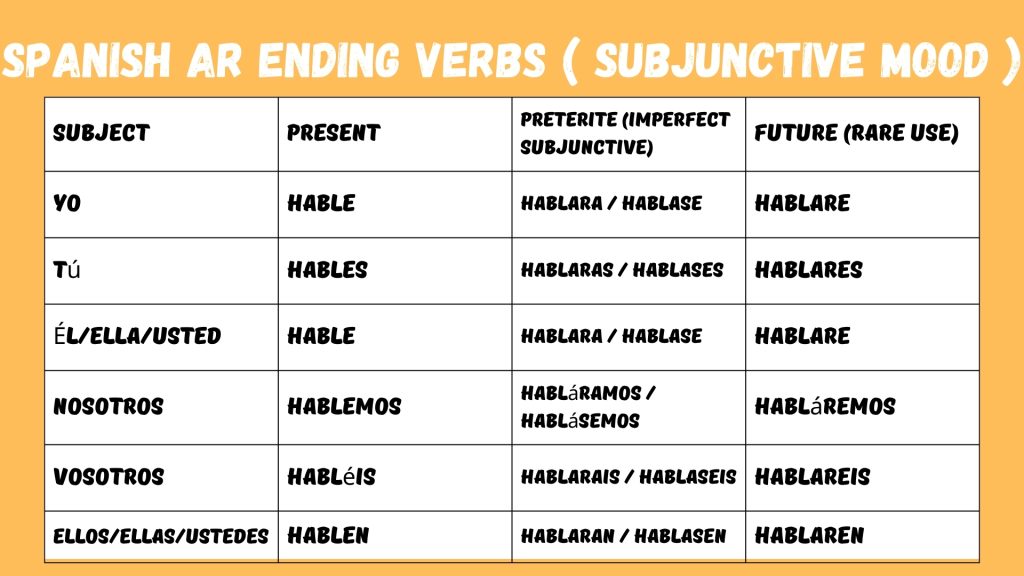
Present subjunctive AR verb conjugation
Learning how to use the present subjunctive for -AR verbs in Spanish is really important when you want to talk about doubts, wishes, or things that might happen. This mood changes the verb endings to -e, -es, -e, -emos, -éis, -en. These are different from the usual endings. You’ll see it a lot after ‘que’ when someone is talking about what they hope or doubt will happen.
| Subject | Verb (Estudiar) | Sentence |
|---|---|---|
| Yo | estudie | Quiero que yo estudie más. |
| Tú | estudies | Dudo que tú estudies lo suficiente. |
| Él/Ella/Usted | estudie | Espero que ella estudie mucho. |
| Nosotros | estudiemos | Ojalá que nosotros estudiemos juntos. |
| Vosotros | estudiéis | Es posible que vosotros estudiéis hoy. |
| Ellos/Ellas/Ustedes | estudien | Necesito que ellos estudien para el examen. |
Present perfect subjunctive AR verb conjugation
In Spanish, when you want to talk about -AR verbs and actions that might have happened, you use the present perfect subjunctive. It’s about mixing ‘haya’ with the past participle.
This way of speaking is key when you’re unsure or feeling uncertain about things that happened in the past but still matter now. It’s really handy in situations where your feelings or doubts play a big role.
| Subject | Verb (Hablar) | Sentence |
|---|---|---|
| Yo | haya hablado | Dudo que yo haya hablado con ella. |
| Tú | hayas hablado | Me alegra que tú hayas hablado con el profesor. |
| Él/Ella/Usted | haya hablado | Es posible que ella haya hablado con su jefe. |
| Nosotros | hayamos hablado | Espero que nosotros hayamos hablado lo suficiente. |
| Vosotros | hayáis hablado | Ojalá que vosotros hayáis hablado en la reunión. |
| Ellos/Ellas/Ustedes | hayan hablado | No creo que ellos hayan hablado con claridad. |
Past perfect subjunctive AR verb conjugation
In Spanish, to form the past perfect subjunctive of AR verbs, you use ‘hubiera’ or ‘hubiese’ followed by the past participle of the verb. This tense is used to talk about things that might have happened but didn’t, or to express uncertainty or regret about past actions.
| Subject | Verb (Cantar) | Sentence |
|---|---|---|
| Yo | hubiera/hubiese cantado | Ojalá que yo hubiera cantado mejor. |
| Tú | hubieras/hubieses cantado | Si tú hubieras cantado, habría sido genial. |
| Él/Ella/Usted | hubiera/hubiese cantado | Dudaba que él hubiera cantado en público. |
| Nosotros | hubiéramos/hubiésemos cantado | Si nosotros hubiéramos cantado, la gente habría bailado. |
| Vosotros | hubierais/hubieseis cantado | No creía que vosotros hubierais cantado tan bien. |
| Ellos/Ellas/Ustedes | hubieran/hubiesen cantado | Me sorprendió que ellos hubieran cantado juntos. |
Future imperfect subjunctive AR verb conjugation
The future imperfect subjunctive of -ar verbs is quite a mouthful, right? It’s not used all the time, but it’s really handy for talking about ‘what ifs’ or wishes concerning the future. Think of it as the tense for the big ‘if’ situations.
You’ll mostly see it in very formal writing or in legal stuff where things need to be super precise about conditions.
| Subject | Verb (Bailar) | Sentence |
|---|---|---|
| Yo | bailare | Si yo bailare bien, ganaría el concurso. |
| Tú | bailares | Si tú bailares mañana, te aplaudirán. |
| Él/Ella/Usted | bailare | Si ella bailare en la final, será increíble. |
| Nosotros | bailáremos | Si nosotros bailáremos juntos, la coreografía será perfecta. |
| Vosotros | bailareis | Si vosotros bailareis en la fiesta, todos se divertirán. |
| Ellos/Ellas/Ustedes | bailaren | Si ellos bailaren en la competencia, ganarán. |
Future perfect subjunctive
When we dive into the future perfect subjunctive in Spanish, we see it’s used to talk about what might happen, but only as a guess or a maybe. It’s a way of using the helper verb ‘haber’ in a special mood with the main verb’s past part. You’ll mostly find it in sentences that start with words showing uncertainty or conditions about things that could happen down the line.
| Subject | Verb (Estudiar) | Sentence |
|---|---|---|
| Yo | hubiere estudiado | Si yo hubiere estudiado más, habría pasado el examen. |
| Tú | hubieres estudiado | Si tú hubieres estudiado, no habrías fallado. |
| Él/Ella/Usted | hubiere estudiado | Si él hubiere estudiado, no tendría dudas. |
| Nosotros | hubiéremos estudiado | Si nosotros hubiéremos estudiado, el resultado sería mejor. |
| Vosotros | hubiereis estudiado | Si vosotros hubiereis estudiado, estaríais listos. |
| Ellos/Ellas/Ustedes | hubieren estudiado | Si ellos hubieren estudiado, ya serían expertos. |
Imperative mood
The imperative mood helps you give direct commands or requests in Spanish.
For regular -AR verbs, drop the -AR and add -a for tú commands, -e for usted, -ad for vosotros, and -en for ustedes.
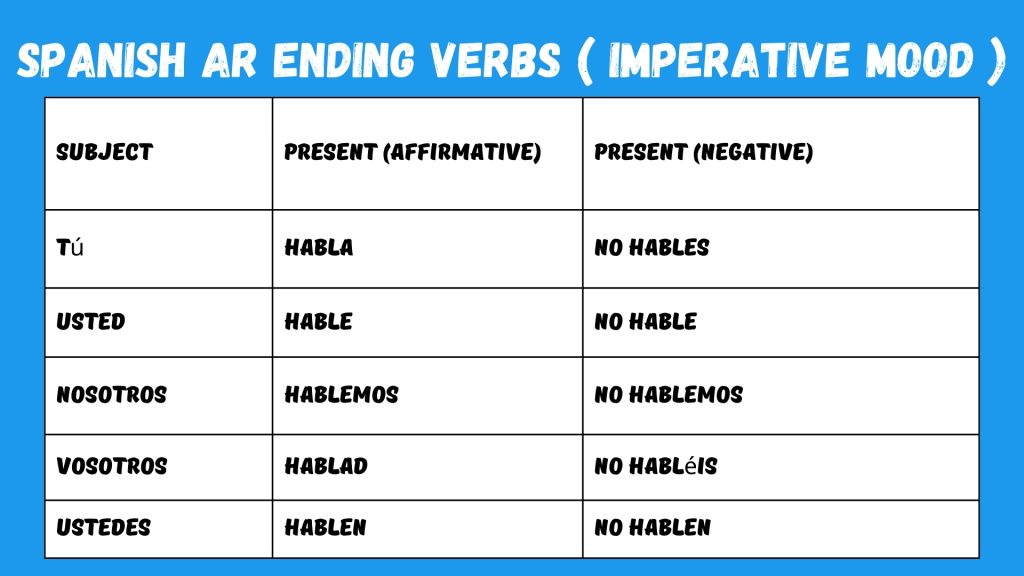
You need this to give clear instructions or make requests in everyday talk.
| Subject | Verb (Caminar) | Sentence |
|---|---|---|
| Tú | camina | Camina rápido. |
| Usted | camine | Camine por esta calle. |
| Nosotros | caminemos | Caminemos juntos al parque. |
| Vosotros | caminad | Caminad hasta la plaza. |
| Ustedes | caminen | Caminen con cuidado. |
Conclusion
Knowing how to use AR ending verbs in Spanish is key for clear communication.
You need to understand how these verbs change in different situations—like when giving facts, making requests, or talking about possibilities.
This helps you express a variety of actions and feelings clearly.
Once you get this down, you’ll communicate more effectively, whether you’re speaking or writing in Spanish.
Spanish Courses at Lingua Viva – Start your Spanish learning journey with courses.
Carolina is a charming and lively member of Lingua Viva with 11+ years of teaching experience. She loves to teach students appropriate ways to communicate effectively in Spanish without the fear of making mistakes. She holds a professional teaching license and has a graduate degree with emphasis in Foreign Language.
